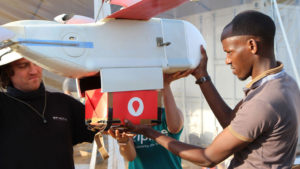by Ben Taylor
Drone-based deliveries of blood and medical supplies to be trialled
The UK government is supporting a trial using drones to deliver blood and other medical supplies to remote health clinics in Tanzania. The idea is to dramatically cut the time spent distributing such supplies. The Ifakara Health Institute will be the local partner.
The drones – known as “Zips” – are small fixed-wing aircraft that are launched from a catapult. They then follow a pre-programmed path using GPS location data. Compared to multi-rotor models, the Zips cope better with windy conditions and stay airborne for longer. In theory, they can fly up to about 180 miles (290km) before running out of power. However, they require open space to land: an area about the size of two car parking slots. These drones will get round this by descending to around 5m when they reach a clinic and then dropping their loads via paper parachutes.
Dfid estimates that flying blood and medical supplies by drone from Dodoma to surrounding clinics could save around £50,000 a year com
pared to using cars or motorcycles. But they add that the time savings are more significant.
“Flights are planned to start in early 2017, and when they do it is estimated that [the] UAVs could support over 50,000 births a year, cutting down the time mothers and new-borns would have to wait for life-saving medicine to 19 minutes – reduced from the 110 minutes traditional transport methods would take,” a spokeswoman explained. “This innovative, modern approach ensures we are achieving the best results for the world’s poorest people and delivering value for money for British taxpayers,” said the International Development Secretary Priti Patel. (BBC)
Kenya turns down Tanzania’s offer of doctors to provide strike cover
The Tanzanian government offered to send 500 medical doctors to Kenya to help overcome the effects of a strike in public hospitals in the neighbouring country. This was despite Tanzania itself facing a serious shortage of medics at its own hospitals.
Kenya’s doctors went on strike in public hospitals on December 5 last year, demanding better pay and working conditions. The strike means that many public hospitals in Kenya have had to turn away some patients, and has reportedly caused the deaths of several patients at public hospitals. It has threatened to undermine Kenyan President Uhuru Kenyatta’s bid for a second term in the country’s presidential election in August, according to analysts.
President Magufuli responded positively to a request from Kenyan President Uhuru Kenyatta for more doctors after he was visited by Kenya’s health minister, Cleopas Mailu, in Dar es Salaam. “Tanzania has accepted Kenya’s request for 500 doctors to help the country deal with a shortage of doctors at its medical centres following a doctors’ strike,” said a statement from the President’s Office.
The Minister for Health, Community Development, Gender, Elderly and Children, Ummy Mwalimu, said Tanzania has “many qualified medical doctors who are currently unemployed.”
However, a section of the medical fraternity in Kenya interpreted the offer as a form of strike-breaking, and responded by strongly hinting that the Tanzanian doctors can expect a hostile reception, triggering fears that the Tanzanian doctors could be thrown into the middle of Kenya’s tense political process and aggressive trade union movement. A court in Kenya then issued an injunction barring the government from recruiting doctors from Tanzania.
The president of the Medical Association of Tanzania (MAT), Dr Obadia Nyongole, reminded the Tanzanian government of the need to address a shortage of doctors in the country’s own medical centres. Tanzania has an estimated 2,250 medical doctors, less than half the number required to meet World Health Organisation minimum standards: the requirement is around 5,000 doctors. (The Guardian, The Citizen)

